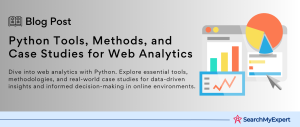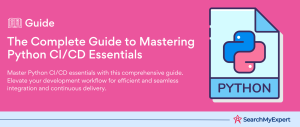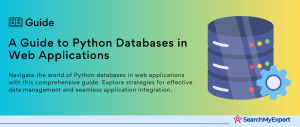Leveraging Python Frameworks for SEO-Friendly Web Apps
The Critical Role of SEO in Web Application Success
SEO isn’t just a digital marketing strategy; it’s the cornerstone of web app visibility. In the digital age, SEO is crucial for ensuring your web app stands out in the crowded online space.
Unique SEO Challenges for Web Apps
Unlike traditional websites, web apps present unique challenges for SEO. They are dynamic, content-heavy, and often complex, making it tough for search engines to crawl and index them effectively.
Python: The Game-Changer in Web Development
Enter Python, a programming language that’s reshaping the web development landscape. Its simplicity, flexibility, and robustness make it ideal for developing sophisticated web applications.
Harnessing Python Frameworks for SEO
Python frameworks are equipped with features to overcome SEO challenges. They offer tools for building web apps that are not only functionally superior but also optimized for search engines. This translates to enhanced visibility, improved search rankings, and increased web traffic.
Choosing the Right Framework
Python, with its diverse range of frameworks, offers a plethora of options for web development. Each framework has its unique features and capabilities, especially when it comes to SEO-friendliness. Let’s dive into the world of Python frameworks!
Python Frameworks: A Comparative Analysis
Django: The All-Rounder
- SEO Strengths:
Django, known for its “batteries-included” philosophy, offers extensive built-in features for SEO. It supports custom URL routing, sitemaps, and human-readable URLs. - Community and Performance: With a large community, Django provides excellent support and resources. It’s known for its scalability and performance.
- Ease of Implementation:
Fairly straightforward for those familiar with Python.
Flask: The Minimalist
- SEO Strengths:
Flask is lightweight and highly customizable, making it suitable for SEO optimizations. It allows for the integration of SEO tools and plugins. - Community and Performance: Smaller community than Django, but sufficient. Flask offers good performance, especially for smaller apps.
- Ease of Implementation:
Easy for beginners, with a less steep learning curve than Django.
Pyramid: The Flexible
- SEO Strengths: Pyramid is known for its flexibility. It allows for fine-tuning, which can be advantageous for SEO strategies.
- Community and Performance: It has a smaller community compared to Django. Pyramid performs well in both small and large applications.
- Ease of Implementation: Requires more effort to implement due to its flexibility.
Top Recommendations for SEO
- Django: Best for those who want a framework with rich built-in features and a robust community.
- Flask:
Ideal for smaller projects or those who prefer a minimalistic and customizable approach.
When choosing a Python framework for SEO-friendly web apps, consider your project’s size, your team’s expertise, and the specific SEO features you need. Django and Flask stand out as top contenders for their balance of features, community support, and overall performance in SEO.
Optimizing App Structure and Content
In the realm of SEO, the structure and content of your web app play a pivotal role. Here’s how Python frameworks can be instrumental in this aspect.
Clean and Semantic HTML: The SEO Foundation
- Why It Matters: Clean, well-structured HTML is crucial for SEO. It helps search engines understand and rank your content effectively.
- Python’s Role:
Python frameworks like Django and Flask encourage clean code practices. They provide templates and tools to generate semantic HTML code.
Simplifying Code Structure and Content Organization
- Structured Approach: Python frameworks simplify the organization of web app components. They follow the MVC (Model-View-Controller) pattern, ensuring a clean separation of concerns.
- Content Organization:
These frameworks offer efficient ways to manage content, making it more accessible and indexable by search engines.
SEO Best Practices in Web Apps
- Headings:
Use them wisely to structure your content. They guide both users and search engines through your app’s content. - Meta Descriptions: Craft them to accurately describe each page’s content. They influence click-through rates from search results.
- Internal Linking:
Essential for SEO. Python frameworks allow for easy implementation of internal links, enhancing site navigation and page authority.
Dynamic Content and User-Generated Content: SEO Boosters
- Dynamic Content: Python frameworks excel in handling dynamic content, which keeps your site fresh and engaging.
- User-Generated Content: Encourage it within your app. It adds new content regularly, which is a plus for SEO.
Python frameworks not only streamline the development process but also offer powerful tools and practices for SEO optimization. From clean code to dynamic content management, they cover all bases to ensure your web app ranks high in search results.
Technical SEO with Python Frameworks
Technical SEO is a critical component in the SEO ecosystem. Let’s explore how Python frameworks play a pivotal role in optimizing these aspects.
Essential Technical SEO Considerations
- URL Structure:
Clean, structured URLs are vital for both user experience and search engine rankings. - Sitemaps: They guide search engines through the site’s content, ensuring proper indexing.
- Robot.txt Configuration:
It controls how search engines crawl and index the site.
Automating SEO with Python Frameworks
- Sitemap Generation:
Python frameworks like Django have modules to automatically generate sitemaps. This simplifies the process and ensures your sitemap is always up-to-date. - Robot.txt Management:
These frameworks offer tools to create and manage robot.txt files effectively, optimizing how search engines interact with your web app.
Mobile-Friendliness: A Ranking Factor
- Impact on SEO:
With the increasing use of mobile devices, mobile-friendliness has become a key ranking factor in SEO. - Python’s Role: Python frameworks are equipped to build responsive and mobile-optimized web apps. They offer functionalities to ensure your web app looks and performs well on all devices.
Python Frameworks: Building for the Future
Python frameworks are not just about making development easier; they are about future-proofing your web app. By addressing technical SEO considerations, ensuring mobile-friendliness, and automating complex processes, they help your web app achieve and maintain a competitive edge in search engine rankings.
On-Page Optimization with Python Libraries
On-page SEO is a critical factor in ensuring your web app’s content is discoverable and ranks well. Python offers a suite of libraries and tools to enhance these efforts.
Python Libraries for Keyword Research and Analysis
- Function:
Identify high-performing keywords and understand user search intent. - Tools:
Libraries like Beautiful Soup and Requests can scrape search engine results, while NLTK and Pandas can analyze keyword trends and patterns.
Optimizing Title Tags, Meta Descriptions, and Alt Attributes
- Title Tags: Use Python scripts to ensure title tags are concise, relevant, and include target keywords.
- Meta Descriptions: Automate the generation of unique and compelling meta descriptions for each page.
- Image Alt Attributes:
Python can automate the process of adding descriptive alt attributes to images, enhancing SEO and accessibility.
Analyzing Content Quality and Readability
- Tools:
Libraries like TextBlob and spaCy provide insights into content quality, sentiment, and readability. - Function:
Ensure the content is not only SEO-friendly but also engaging and easy to read for users.
The Importance of User Experience and Engagement
- UX and SEO: An intuitive and engaging user experience is key to SEO success. High user engagement signals to search engines that your content is valuable.
- Python’s Role:
Python frameworks and libraries can be used to analyze user behavior, optimize loading times, and enhance overall user experience.
Python’s diverse libraries and tools offer extensive capabilities for on-page SEO optimization. From keyword analysis to content quality checks, Python ensures your web app is not only SEO-compatible but also user-centric.
Off-Page SEO Strategies with Python
Off-page SEO is all about enhancing your web app’s presence and authority outside of its own pages. Python can be a powerful ally in this endeavor.
The Importance of Backlinks and Online Presence
- Backlinks: Essential for SEO, they signal to search engines the credibility and relevance of your web app.
- Online Presence:
A strong presence across various digital platforms boosts visibility and authority.
Social Media Integration and API Development with Python
- Python Frameworks:
They facilitate seamless social media integration and API development, crucial for amplifying your web app’s reach. - Benefits:
Easier sharing of content, enhanced user engagement, and increased backlink opportunities.
Automating Social Media and Influencer Outreach
- Tools:
Python libraries like Tweepy for Twitter, or Facepy for Facebook, can automate social media interactions. - Influencer Outreach:
Python can help identify potential influencers and automate outreach efforts, expanding your web app’s visibility.
Building a Community Around Your Web App
- Strategy:
Use Python to create forums, chat applications, or user groups to foster a community. - Engagement:
Engage with your audience regularly. Python can assist in analyzing user interactions and preferences, leading to more targeted and effective communication.
Python’s versatility extends beyond on-page SEO. It empowers web apps with robust off-page SEO strategies, from social media integration to community building, ensuring a comprehensive approach to SEO.
Monitoring and Adapting for SEO Success
The final, but ongoing step in the SEO journey involves meticulous monitoring and adapting.
Tracking SEO Performance Metrics
- Why It’s Crucial:
Tracking metrics like website traffic, keyword rankings, and conversions provides insights into your SEO strategy’s effectiveness. - Python’s Edge:
With its libraries and tools, Python simplifies the collection and analysis of these critical metrics.
Python Tools for Analytics and Visualization
- Libraries:
Python offers libraries like Pandas for data analysis and Matplotlib for data visualization, making it easier to interpret SEO data. - Functionality: These tools can help identify trends, track progress, and pinpoint areas needing improvement.
The Need for Continuous Monitoring and Adaptation
- Evolving SEO Landscape:
SEO is not a set-and-forget task. It demands ongoing attention and tweaks based on performance data. - Python’s Role: Automate data collection and analysis, enabling you to respond quickly to changes in SEO trends and search engine algorithms.
Conclusion
Python frameworks stand out as powerful allies in building and maintaining SEO-friendly web apps. They not only streamline development but also provide essential tools for ongoing SEO monitoring and adaptation. This makes Python an invaluable asset for anyone looking to achieve long-term SEO success.
In the ever-changing world of SEO, Python frameworks offer the flexibility, efficiency, and depth needed to stay ahead.
Let our Python Development Service Company be your guide to Python excellence.
Table of Contents
Toggle






